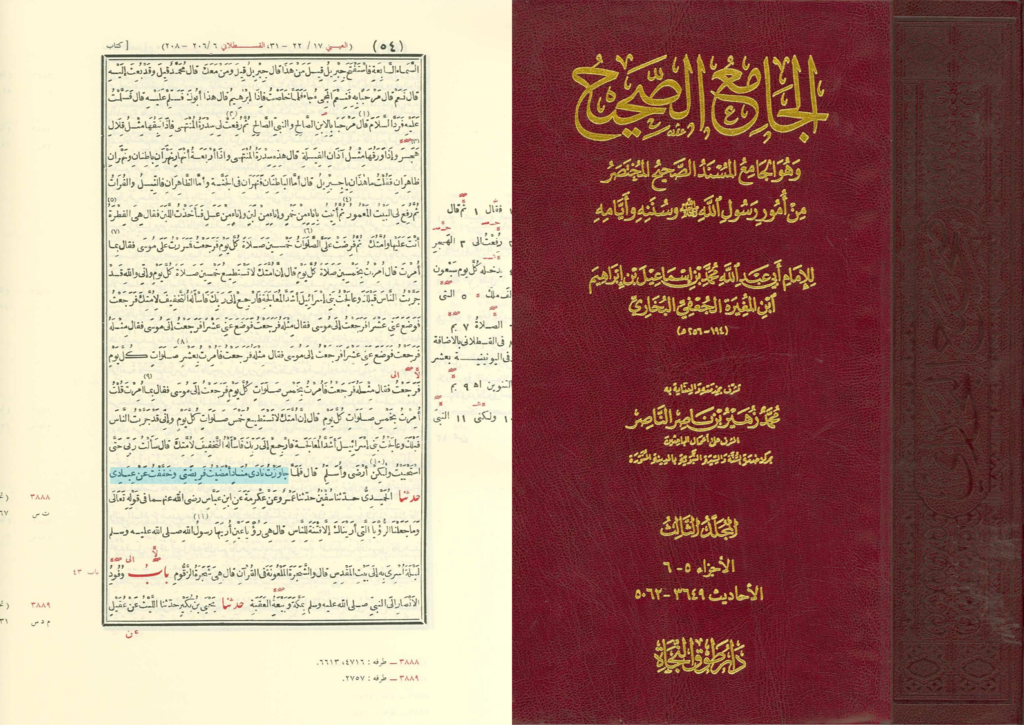The Hadith of Nuzul (Narration of Al-Bukhariyy)
ينزل ربنا إلى السماء الدنيا
“Yanzilu Rabbuna ila-s-sama’i-d-dunya”
[Al-Bukhariyy. Sahih Al-Bukhariyy. Volume 2. Page 53. Hadith Number 1145.]
Q: What is the literal meaning of “nuzul (descent)”?
A: In Arabic, literal “nuzul (descent)” is a transfer from a higher place to a lower. Ibn Faris, author of the dictionary Al-Maqayis said (Vol 5. Page 417):
تَدُلُّ عَلَى هُبُوطِ شَيْءٍ وَوُقُوعِهِ. وَنَزَلَ عَنْ دَابَّتِهِ نُزُولًا. وَنَزَلَ الْمَطَرُ مِنَ السَّمَاءِ نُزُولًا
It indicates a thing’s falling and dropping. (For example): One nazala (descended) from his animal nuzul[an] (a descent); the rain nazala (descended) from the sky nuzul[an] (a descent).
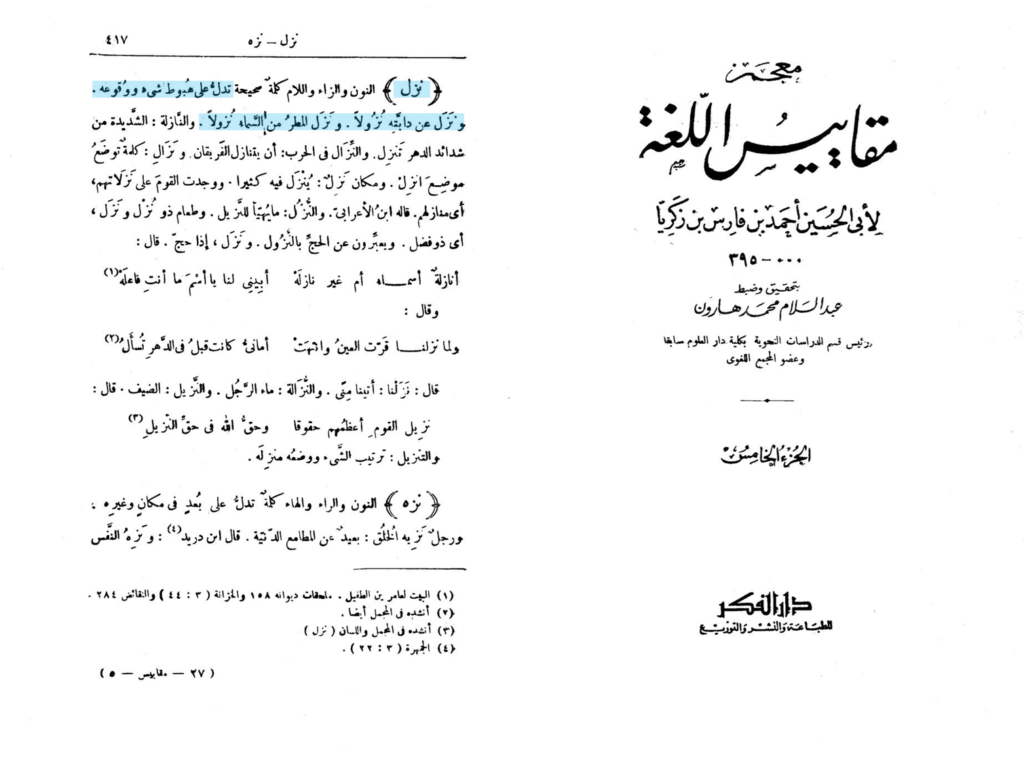
Reference: https://archive.org/details/FP2021/03_2024/page/n29/mode/1up
Ibn Faris. Maqayis Al-Lughah. Volume 5. Page 417.
Therefore, if a desperate Wahhabiyy, out of shame of his true belief, says, “I did not say that Allah moves!”
Respond: But you said you take the literal meaning!
You may also respond: Do you deny that He moves? Here, he will likely go silent because he does not want to deny that. If he does, however, then he agreed with us. Then we tell him not to translate it literally if he does not believe in the literal meaning.
What the scholars said is that the “Nuzul” of Allah is not motion or transfer, without translating it; they denied the literal meaning while not specifying any alternative meaning, as mentioned numerous times already.
Q: What is the Scholarly Explanation of this Hadith?
Let us refer to Ibn Hajar Al-ˆAsqalaniyy, Amiru-l-Mu’minin fi-l- Hadith (The prince of the Muslims in the science of hadith), the “Seal of the Hafidhs”. His book Fathu-l-Bari is the most famous of the explanations of Al-Bukhariyy.
[Fath Al-Bari, Volume 3, Page 30]
Here is some of his commentary:
اسْتَدَلَّ بِهِ مَنْ أَثْبَتَ الْجِهَةَ وَقَالَ هِيَ جِهَة الْعُلُوّ وَأنكر ذَلِك الْجُمْهُور لِأَنَّ الْقَوْلَ بِذَلِكَ يُفْضِي إِلَى التَّحَيُّزِ تَعَالَى اللَّهُ عَنْ ذَلِكَ وَقَدِ اخْتُلِفَ فِي مَعْنَى النُّزُولِ عَلَى أَقْوَالٍ فَمِنْهُمْ مَنْ حَمَلَهُ عَلَى ظَاهِرِهِ وَحَقِيقَتِهِ وَهُمُ الْمُشَبِّهَةُ تَعَالَى اللَّهُ عَنْ قَوْلِهِمْ
“Those who confirm a direction for Allah use it as proof, claiming it is the direction of above, and the majority has rejected that, because such a saying leads to containment, Exalted is Allah from that. There are different sayings about the meaning of “nuzul”. Some carry it on its apparent and literal meaning, and those are the Likeners, and Allah is Exalted from their saying.”
And he said:
وَمِنْهُمْ مَنْ أَجْرَاهُ عَلَى مَا وَرَدَ مُؤْمِنًا بِهِ عَلَى طَرِيقِ الْإِجْمَالِ مُنَزِّهًا اللَّهَ تَعَالَى عَنِ الْكَيْفِيَّةِ وَالتَّشْبِيهِ وَهُمْ جُمْهُورُ السَّلَف
“Some kept (its wording) as it was narrated, believing in it without specifying a meaning, while clearing Allah from manner of being and resemblance, and those are the majority of the Salaf,”
And just like An-Nawawiyy, he says:
وَمِنْهُمْ مَنْ أَوَّلَهُ عَلَى وَجْهٍ يَلِيقُ مُسْتَعْمَلٍ فِي كَلَامِ الْعَرَبِ
“And among them are those who interpreted it in a befitting way used in the speech of the Arabs.”
And he copies that Ibnu-l-ˆArabiyy said:
فَأَمَّا قَوْلُهُ يَنْزِلُ فَهُوَ رَاجِعٌ إِلَى أَفْعَالِهِ لَا إِلَى ذَاتِهِ، بَلْ ذَلِكَ عِبَارَةٌ عَنْ مُلْكِهِ الَّذِي يَنْزِلُ بِأَمْرِهِ وَنَهْيِهِ وَالنُّزُولُ كَمَا يَكُونُ فِي الْأَجْسَامِ يَكُونُ فِي الْمَعَانِي فَإِنْ حَملته فِي الحَدِيث على الْحسي قَتلك صِفَةُ الْمَلَكِ الْمَبْعُوثِ بِذَلِكَ
‘His saying “yanzilu” refers to His Doings[His Act of Creating], not to His Self; it refers to Allah’s Angel who descends with His Order and His Prohibition. Nuzul, as it exists in bodies, also has allegorical meaning. If you carry the hadith by the physical meaning, it is the attribute of the dispatched Angel with that …’
Then Ibn Hajar said:
وَالْحَاصِلُ أَنَّهُ تَأَوَّلَهُ بِوَجْهَيْنِ إِمَّا بِأَنَّ الْمَعْنَى يَنْزِلُ أَمْرُهُ أَوِ الْمَلَكُ بِأَمْرِهِ وَإِمَّا بِأَنَّهُ اسْتِعَارَةٌ بِمَعْنَى التَّلَطُّفِ بِالدَّاعِينَ وَالْإِجَابَةِ لَهُمْ وَنَحْوِهِ
The summary is that he (Ibnu-l-ˆArabiyy) explained it in two ways: either that yanzilu means His Order comes down, or His Angel with His Order, or else it is figurative, by the meaning of mercy upon those who supplicate (at night), the answering of their prayers, and the like.
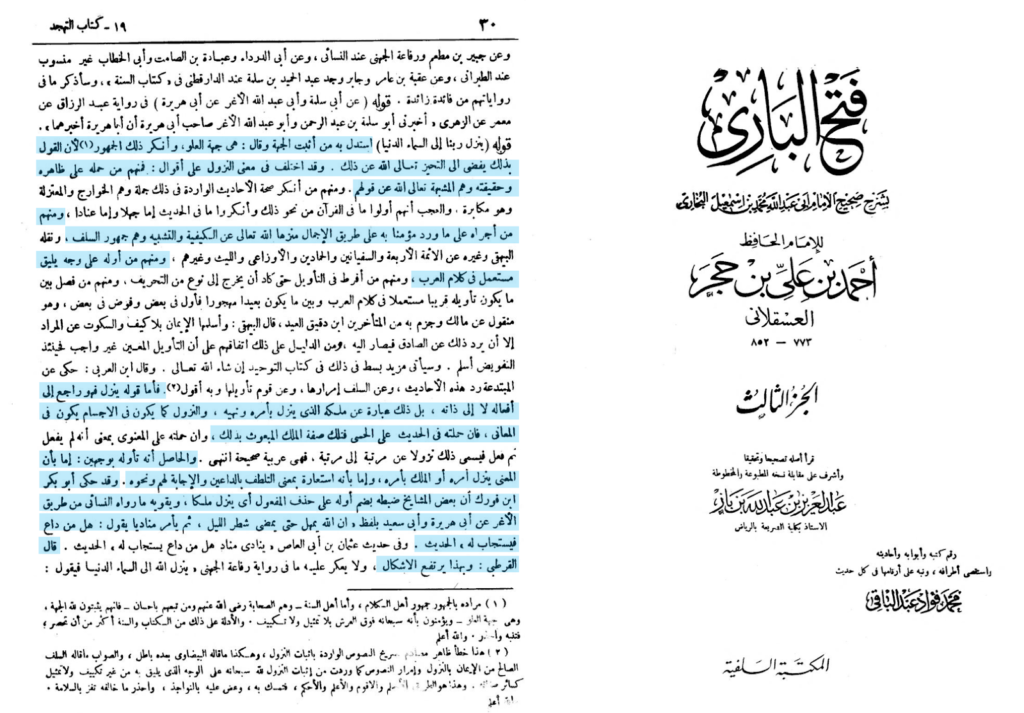
Reference: https://archive.org/details/FP2021/03_2024/page/n29/mode/1up
Al-Hafidh Ibn Hajar. Fathul-Bari. Volume 3. Page 30.
Q: Does the Hadith of Nuzul have various wordings?
Yes, it has a number of renditions. Ibn Hajar said [Fath Al-Bari, Volume 3, Page 30]:
وَقَدْ حَكَى أَبُو بَكْرِ بْنُ فُورَكَ أَنَّ بَعْضَ الْمَشَايِخِ ضَبَطَهُ بِضَمِّ أَوَّلِهِ عَلَى حَذْفِ الْمَفْعُولِ أَيْ يُنْزِلُ مَلَكًا وَيُقَوِّيهِ مَا رَوَاهُ النَّسَائِيُّ مِنْ طَرِيقِ الْأَغَرِّ عَنْ أَبِي هُرَيْرَةَ وَأَبِي سَعِيدٍ بِلَفْظِ إِنَّ اللَّهَ يُمْهِلُ حَتَّى يَمْضِيَ شَطْرُ اللَّيْلِ ثُمَّ يَأْمُرُ مُنَادِيًا يَقُولُ هَلْ مِنْ دَاعٍ فَيُسْتَجَابُ لَهُ الْحَدِيثَ وَفِي حَدِيثِ عُثْمَانَ بْنِ أَبِي الْعَاصِ يُنَادِي مُنَادٍ هَلْ مِنْ دَاعٍ يُسْتَجَابُ لَهُ الْحَدِيثَ قَالَ الْقُرْطُبِيُّ وَبِهَذَا يَرْتَفِعُ الْإِشْكَالُ.
‘Abu Bakr Ibn Furak said that some shaykhs have narrated it with a dammah on its beginning [so that it reads: يُنزل ربنا “yunzilu Rabbuna”.], while omitting the direct object, i.e., He sends down an Angel. What strengthens that is what was narrated by An-Nasa’iyy:
إِنَّ اللَّهَ يُمْهِلُ حَتَّى يَمْضِيَ شَطْرُ اللَّيْلِ ثُمَّ يَأْمُرُ مُنَادِيًا يَقُولُ هَلْ مِنْ دَاعٍ فَيُسْتَجَابُ لَهُ
“After the middle of the night passes, certainly Allah orders a caller to call out ‘Is there anyone making supplication, so that it would be answered for him?’”
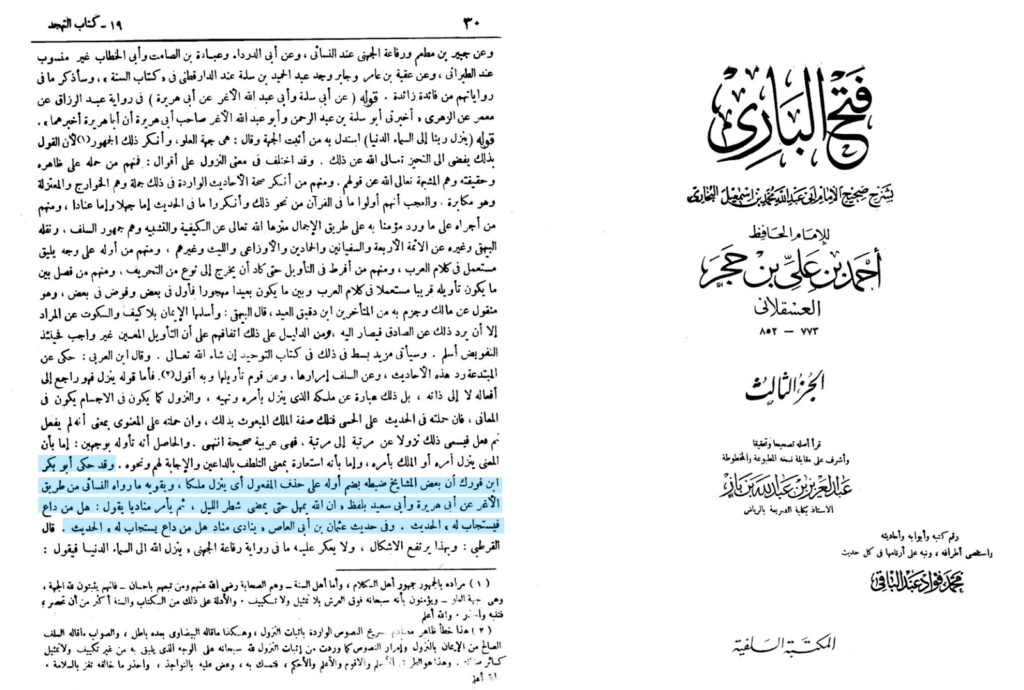
Reference: https://archive.org/details/FP2021/03_2024/page/n29/mode/1up
Al-Hafidh Ibn Hajar. Fathul-Bari. Volume 3. Page 30.
Al-Hafidh An-Nasa`iyy, in ^Amalul-Yawmi Wal-Laylah, Page 340, Hadith Number 482.
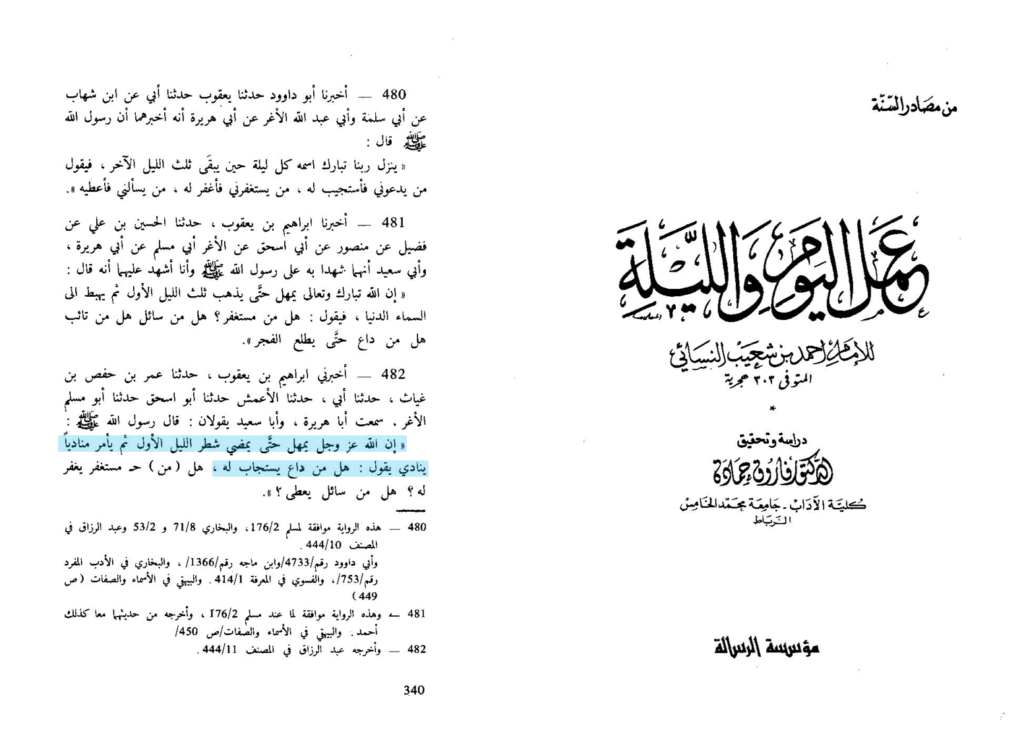
Q: Is there other evidence in which an Angel conveys from Allah speaking in the first person?
A: In the Sahih Al-Bukhariyy, the Prophet ﷺ said about when he was in the heavens on the Night of the Ascension:
فَلَمَّا جَاوَزْتُ نَادَى مُنَادٍ: أَمْضَيْتُ فَرِيضَتِي، وَخَفَّفْتُ عَنْ عِبَادِي
“When I went beyond, a caller called out: ‘I have settled what I made obligatory and I have lightened (the burden) for My slaves!’”
Here, it was as if the Prophet ﷺ said, “… A caller called out (conveying from his Lord): I have settled what I made obligatory …”
Reference: https://archive.org/details/sa71mir_gmail_P03/P05/page/n62/mode/1up
Sahih Al-Bukhariyy. Volume 5. Page 54. Hadith Number 3887.
